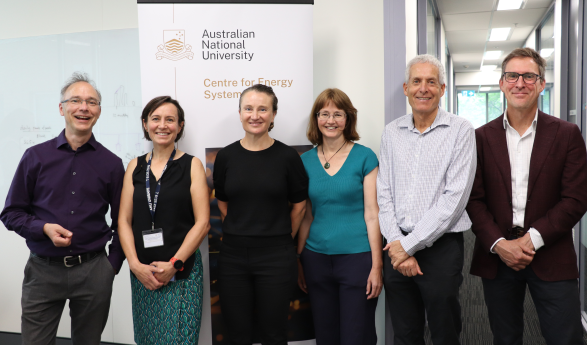
4 November 2024
A new Centre that brings together pioneering experts in clean energy research has been established at the Australian National University. With a mission to accelerate economy-wide decarbonisation and limit the effects of human-induced climate change, the Centre will take a holistic systems-based approach to working with uncertainty, dynamism and complexity.
The ANU Centre for Energy Systems (ACES) aligns with the new academic structure to ensure the long-term sustainability of the University through the creation of new centres of gravity and purpose. In an increasingly interconnected world, the Centre will provide a systems-based approach to the energy transition including working with the harder to abate sectors and demonstrating novel approaches to 21st century challenges using existing technologies.
ACES incorporates the ANU Battery Storage and Grid Integration Program (BSGIP) and the ANU 100 Percent Renewable Energy Group (RE100) combining cutting edge research in energy storage systems and world leading expertise in pumped hydro energy storage.
Diversity and equity are foundations upon which ACES is built, to this end, the Centre will be co-led by two exceptional female leaders, Professor Kylie Catchpole FAA FTSE and Associate Professor Heather Logie. Located within the School of Engineering, in the College of Engineering, Computing and Cybernetics, the team is comprised of researchers, professional staff and higher degree students with diverse industry, gender and cultural backgrounds.
“The Centre will take a comprehensive, integrated approach to understanding energy system change and transition, said Professor Catchpole, ACES Co-Director. “The social, technical, economic, and environmental aspects of the transition are all important components of understanding and enabling change. By applying a systems thinking lens to the way in which we work we will consider multiple disciplinary perspectives, analyse the strengths and weaknesses of these perspectives and integrate their insights to produce a new, more comprehensive understanding of ways to tackle the energy transition,” said Professor Catchpole.
“For the energy transition to be effective, it is important to be able to explore the likely impact of proposed changes, evaluate the likely outcomes and compare options. We refer to this as multi-energy system modelling (MES), said Associate Professor Heather Logie, ACES Co-Director. “Our MES approach will be characterised by large-scale optimisation, whole-of-supply-chain modelling and importantly, the incorporation of social dimensions to understand how the integration of these new technologies will interact in the emerging energy system, and what this will mean for people. Technology needs to be built to serve people, importantly we have a team of social scientists with experience in energy justice and equity, value sensitive design and ensuring all voices are heard,” said Associate Professor Logie.
ACES will focus on the real-world application of its research and work closely with industry, regulators, governments, NGOs and community and consumer groups both in Australian and internationally. ACES brings together leading researchers from a range of disciplines including engineering, physics, computing and the social sciences. A defining feature of the Centre will be its transdisciplinary approach to energy transition, that is the integration of separate branches of expertise to extend fields of knowledge above and beyond what can be in isolation.
ACES builds on the legacy of some of the world’s most celebrated clean energy researchers and pioneering, multi-award-winning projects. Some of the more recent accolades bestowed upon BSGIP & the RE100 Group include: ACT Scientist of the Year, 2024 (Dr Bjorn Sturmberg); election of Professors Andrew Blakers and Kylie Catchpole to Fellowship of the Academy of Science in 2024; 2024 ATSE Clunies Ross Award (Professor Blakers); the 2023 Queen Elizabeth Prize for Engineering (Professor Blakers and others); 2023 Engineers Australia, Canberra Excellence Project Award winner for evolve: smart software for the orchestration of 21st century electricity systems (BSGIP team); Engineers Australia Canberra Excellence Project Award, 2023, Highly Commended Award for Community Energy Models (BSGIP team); ACT Young Tall Poppy Award, 2023 (Dr Bjorn Sturmberg); Chloe Munro Scholarship for Transformational Leaders, 2023 (Associate Professor Marnie Shaw); MA Sargent Medal, Engineers Australia National Awards 2023 (Professor Lachlan Blackhall) and; the 2018 Eureka Prize for Environmental Research for Pumped Hydro Energy Systems Atlases and the impact of analysis of 100 percent renewable energy systems (Professor Blakers and others).
Find out more:
ANU Centre for Energy Systems
